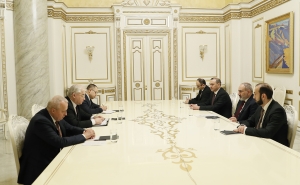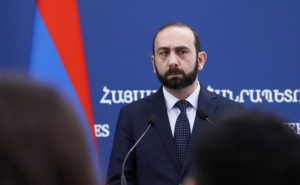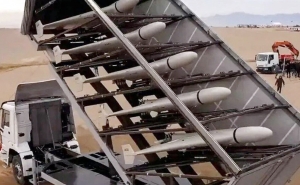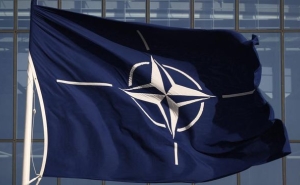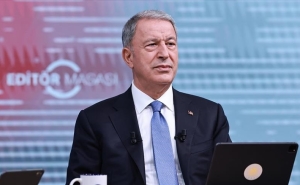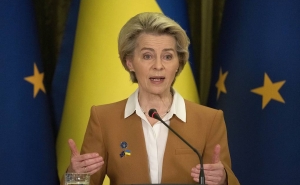 The Russian Signs a Threat to Georgia's Transit Potential
The Russian Signs a Threat to Georgia's Transit Potential

During July 10-11, at the South Ossetia borders, the Russian frontier guards installed new signs, which caused a stormy reaction by the Georgian side. The Georgian leadership, according to the Prime Minister Garibashvili, has taken all available diplomatic steps in connection with the incident, in particular, the Georgian side intends to raise the issue of border movement of UN, OSCE and other international organizations. The Georgian side even presented a note of protest to Russia, with the help of Switzerland.
It is noteworthy that the Georgian opposition and public circles are also very active on the border issue. Georgian opposition demands for a more practical and decisive action, and non-governmental organizations issued a joint statement containing criticism towards Russia, besides quite a serious campaign has started on Facebook.
Though transfer of border signs, as well as building barbed wire has been done before, this time the furious reaction of the Georgian side was more obvious. This is probably explained by several factors.
New signs have appeared in the village Tsitelubani in Gori district and Akhalgoryan village in Orchosani district, as a result of which a section of the Baku-Supsa pipeline had been set apart. 830 km long pipeline yearly provides around 31 million barrels of oil to Black Sea Supsa port from Georgia. As a result of the border signs, around 1605 meter of the pipeline has appeared under the control of the South Ossetian border-guards, which involves quite serious challenges in terms of its further exploitation. This situation is hitting both Georgia’s reputation as a transit country, as well as the country's energy security. Perhaps such risks have forced the Georgian leadership to already think about the alternative route construction for this "captive" segment of the pipeline. It is significant that the South Ossetian authorities also referred to the pipeline's fate telling that in case of any problem related to the operation of the pipeline, the British Petrolium company may apply to them.
The other possible reason of Georgia's tough response, is that the new frontier is located only 500 meters from the Georgia's East-West highway, which through which both local and international transit traffic passes. Indeed, for a country with ambitions of becoming a major hub for international transit, such developments are rather risky and seriously undermine the reputation of the country.
The tough response of the Georgian side had also some humanitarian reasons. As before, now also, because of the transfer of marginal signs, the lands of a number of residents from Georgian villages remained on the other side of the border. The authorities realize that the failure to protect their own citizens and their property is a serious blow to their image. In addition, despite the South Ossetian border-guards assurances that farmers can use their own lands, the experience shows that the appearance of border signs is followed by the strengthening of borders by fixing barbed wires along.
Besides the reasons of furious reaction of Georgian side, it is also quite interesting to understand the reason of the Russian side to move forward the border signs. First of all, it should be noted that Moscow is categorically against any criticism in this regard and insists that concerning the border problems Georgia should contact South Ossetia and not Russia. This approach is well thought, since it is obvious that Georgia still considers Abkhazia and South Ossetia as integral parts, and will not take such a step.
The fact that the Russian side stands behind all this, can also be proved by the last year's agreement between Russia and South Ossetia, according to which Russia has undertaken the South Ossetian security issues, including border protection. As for Moscow's motives of giving such orders to Russian border guards, it is important to look through the two military agreements signed with Georgia during the past month.
This particularly refers to the French ThalesRaytheonSystems (TRS) company and MBDA missiles company’s agreements signed with Georgia as a result of which Georgia will receive modern air defense means. Of course, Russia is aware that the weapon is primarily directed against it and, naturally, could not but react to these military deals.
In addition, with this kind of strategic promotion (by taking into its control a part of Baku-Supsa pipeline and taking an important position in the East-West highway) Russia has tried to solve strategic and tactical problems, and on the other hand, sent a clear message to the Georgian authorities, as well as those Western allies stating that in this current conflict stage, no status quo can be guaranteed.
Other materials on this subject
- Nikol Pashinyan Sent Birthday Greetings to Georgian Counterpart I am confident that with joint efforts we will be able to further strengthen the centuries-old friendship of our peoples and expand cooperation between our states. I am full of optimism with regard to...
- Three Transport Corridors between Russia and Georgia Can Become a Reality The delay of the implementation of the agreement for more than five years was due to various nuances and elements of the agreement (indirect participation of Abkhazia and South Ossetia, the scope of eligibility,...
- Armenia Sends Units of Fire Appliances to Borjomi, Georgia Georgia was offered help from Russia too, but Prime Minister Kvirikashvili said "what we have so far is enough." He hopes that no additional help will be needed.
- Putin Did Not Rule Out the Possibility of Visa Free regime with Georgia "It is extremely important to establish normal relationship between the special services and law enforcement agencies [of the two countries], in order not to allow this [possible] visa-free regime harm...
- Georgia to Continue Balanced Policy in Relations with Russia However, at this stage, there is no progress in resolving main problems.
-
 17:08
17:08The regular session of the Anti-corruption Policy Council takes place in Jermuk
-
 15:05
15:05The Prime Minister sends congratulatory messages to the supreme leader of Iran and the President of Iran
-
 11:11
11:11Armenia sends earthquake aid to Turkey
-
 10:43
10:43Commemoration of the Pontiff St. Sahak Partev
-
 09:16
09:16Some roads are closed and difficult to pass in Armenia
-
 19:55
19:55Phone conversation of the Foreign Minister of Armenia with the U.S. Assistant Secretary of State for European and Eurasian Affairs
-
 18:30
18:30Prime Minister Pashinyan and President Khachaturyan meet
-
 18:20
18:20Ararat Mirzoyan with Co-Chairman of the OSCE Minsk Group of France Brice Roquefeuil
-
 17:01
17:01Humans could land on Mars within 10 years, Musk predicts
-
 16:45
16:45France, US urge 'immediate' end to Nagorno Karabakh blockade
-
 16:01
16:01Blockaded Nagorno Karabakh launches fundraiser to support quake-hit Syria
-
 15:59
15:59Earthquake death toll in Turkey rises to 18,342
-
 15:43
15:43Ararat Mirzoyan Held a Telephone Conversation with Sergey Lavrov
-
 15:06
15:06French president rules out fighter jet supplies to Ukraine in near future
-
 14:47
14:475 Day Weather Forecast in Armenia
-
 14:44
14:44President Vahagn Khachaturyan wrote a note in the book of condolences opened in the Embassy of Syria in Armenia
-
 14:20
14:20Azerbaijan’s provocations impede establishment of peace and stability – Armenian FM tells Russian Co-Chair of OSCE MG
-
 12:57
12:57France representation to OSCE: Paris calls on Azerbaijan to restore freedom of movement through Lachin corridor
-
 11:40
11:40Command of Kosovo forces highly appreciated preparation of Armenian peacekeepers
-
 10:16
10:16The United States withdrew from sanctions against Syria for six months the provision of assistance after the earthquake
day
week
month
Humidity: %
Wind: km/h


